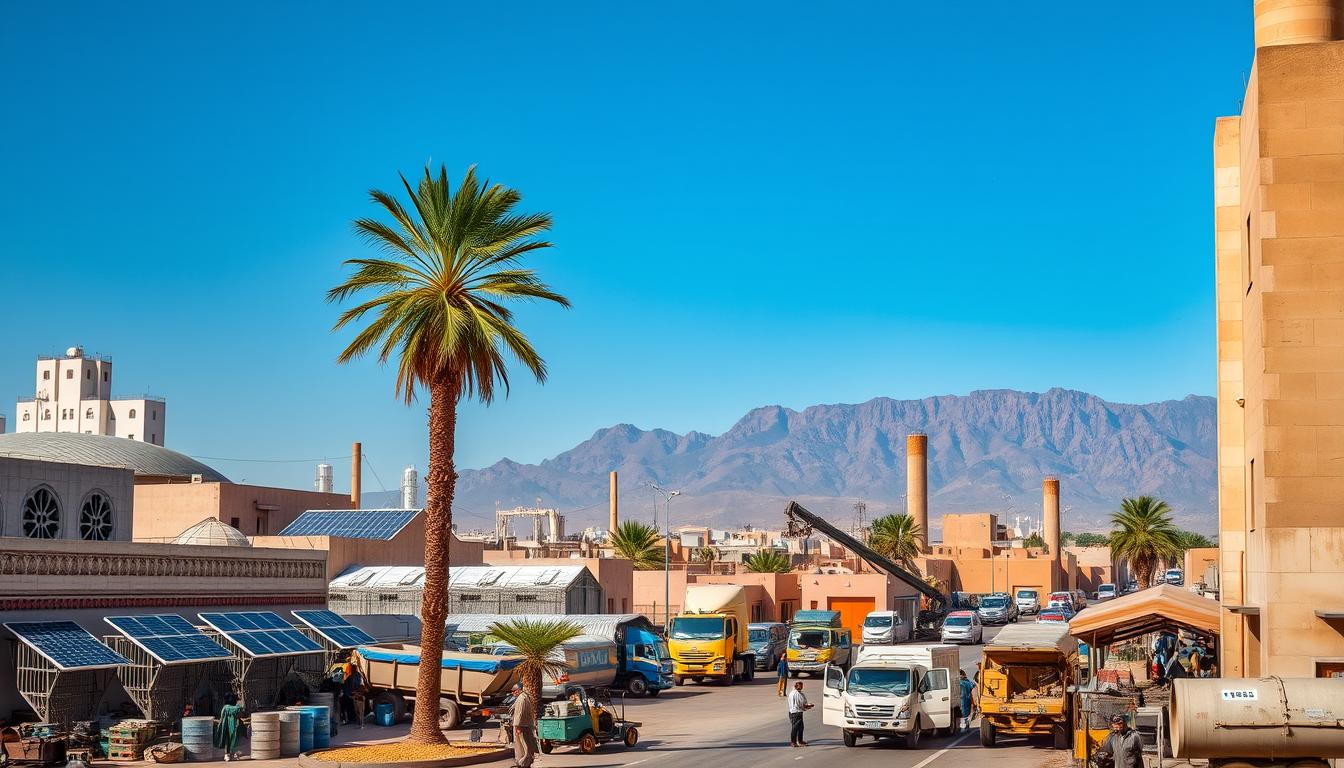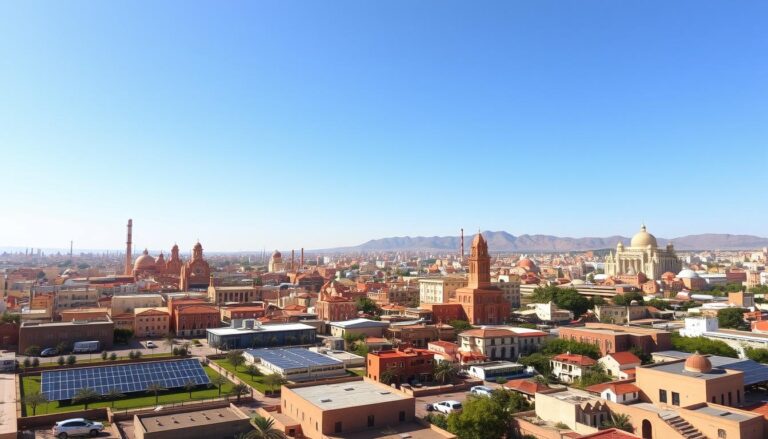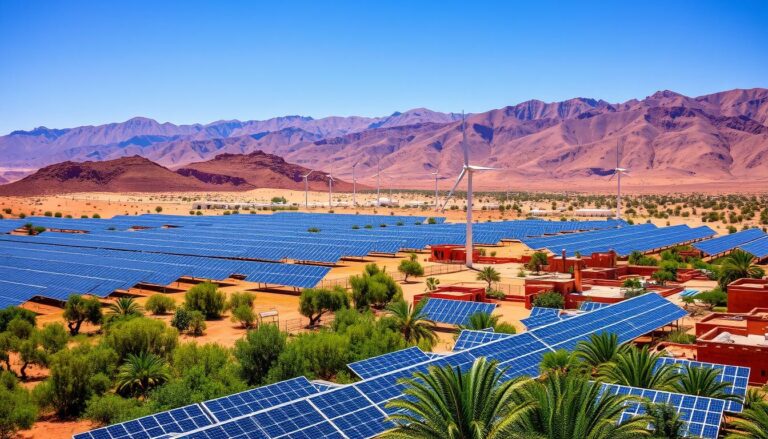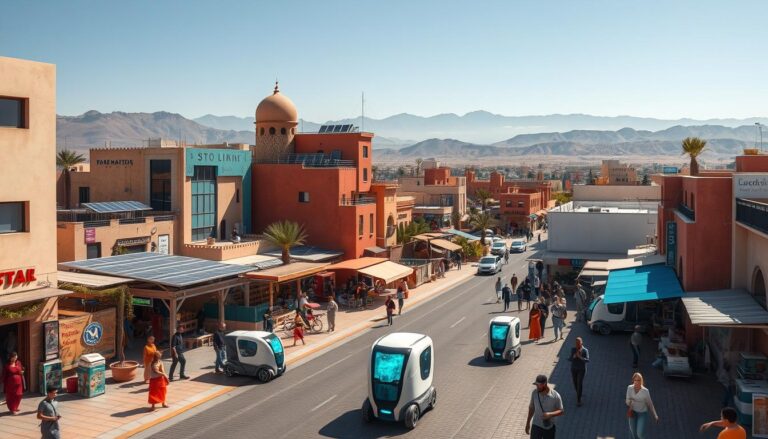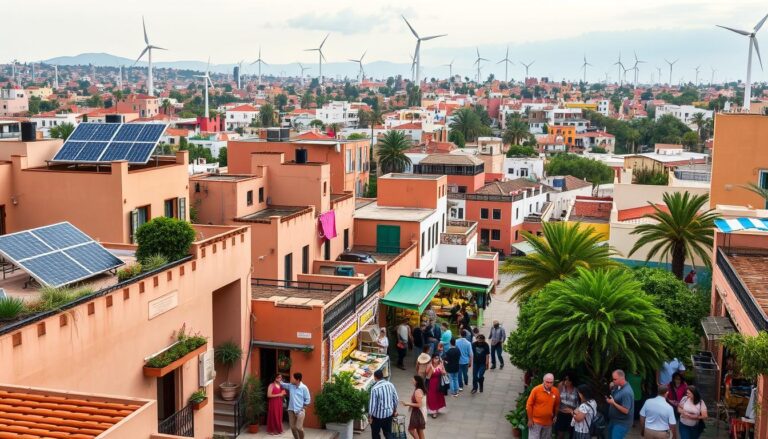What is driving Morocco’s astonishing manufacturing surge and how does it shape the nation’s economic future?
Morocco’s manufacturing sector is growing fast, with a 5.8% increase in production by the second quarter of 2024. Car production soared by 22.7%, and information technology products rose by 25.9%. This growth is changing the country’s economy.
The Moroccan economy has grown at an average of 5.1% over the last decade. This shows the nation’s strong economic growth. The focus on industrial innovation and development is key to this growth. Chemicals and tobacco products have seen big increases, but some sectors like beverages and textiles have declined.
The Industrial Acceleration Strategy aims to increase the industry’s GDP share from 14% to 23%. Morocco’s commitment to industrial development is clear. The country’s industrial output has seen ups and downs, but forecasts suggest steady growth of around 5.00% into 2025.
Stay with us as we explore the factors driving Morocco’s economic growth. We’ll look at government policies, emerging technologies, and what the future holds for Moroccan manufacturing.
Overview of Manufacturing Sector in Morocco
The manufacturing sector in Morocco is key to the country’s economy. It includes various industries like automotive, aerospace, and electronics. Textiles, pharmaceuticals, and food processing also play important roles.
The Moroccan Industrial Acceleration Plan is crucial for the economy. It aims to increase the sector’s contribution to GDP from 14% to 23% by 2030. Morocco’s location between Africa and Europe makes it a major trade hub.
Key Industries
Morocco’s manufacturing sector has several key industries. The automotive sector grew by 5% annually from 2008 to 2018. However, the textile and garments sector saw a 15% drop in 2009 and hasn’t recovered yet.
Economic Contribution
Manufacturing makes up about one-sixth of Morocco’s GDP. Despite challenges, the sector is seeing a revival thanks to the Moroccan Industrial Acceleration Plan. The sector’s employment share has decreased, but it remains a major driver of growth and job creation.
Recent Industrial Growth Trends
Morocco has seen a big boost in its industrial sector lately. The country’s manufacturing growth is impressive, showing the sector’s strength.
Quarterly Growth Data
The latest data shows a big rise in Morocco’s industrial growth. In the second quarter of 2024, there was a 5.8% increase compared to the same time last year. This growth shows how strong Morocco’s industrial sector is, playing a key role in the country’s economy.
Performance of Key Manufacturing Segments
Looking closer at Morocco’s growth, we see some areas doing better than others. For example, car production has seen big jumps, helping drive growth. Also, information technology, chemicals, and tobacco have made big contributions.
But, some areas like beverage production and textiles have seen drops. So, while Morocco’s manufacturing growth is mostly positive, different sectors have different results.
Government Strategies and Policies
The Moroccan government is working hard to grow its manufacturing sector. They have set up several strategic plans to help. These plans aim to make the sector more important to the country’s economy.
Industrial Acceleration Plan
The Industrial Acceleration Plan is a key part of Morocco’s strategy. It aims to make production more efficient, create jobs, and boost the sector’s share of GDP. The plan focuses on key industries and sets the stage for long-term growth, attracting both local and foreign investors.
The government’s efforts have paid off. In 2021, Morocco saw a big increase in foreign direct investment (FDI). The manufacturing sector got 23.6% of FDI stocks that year. This shows the Industrial Acceleration Plan is working well to grow Morocco’s manufacturing.
Advanced Regionalization
The Advanced Regionalization policy is another important strategy. It works to spread power and involve locals more in decision-making. This is especially true for managing and using regional resources.
This policy helps distribute wealth more evenly across the country. It also empowers regions economically. By working with local communities, Advanced Regionalization optimizes local resources. This boosts regional development and helps grow Morocco’s manufacturing sector.
These policies show Morocco’s dedication to improving its industrial capacity. They aim for sustainable economic growth. Morocco is becoming a key player in manufacturing in Africa.
Investment Opportunities in Moroccan Manufacturing
Morocco’s manufacturing sector is now a top choice for investors. It has a stable economy and government support. This makes it a great place for investment opportunities in Moroccan manufacturing with more foreign direct investment in Morocco.
Foreign Direct Investments (FDI)
Foreign direct investment in Morocco has grown a lot. It went from $1.7 billion in 2020 to $2.2 billion in 2021. France, the United Arab Emirates, and Spain are leading investors.
The manufacturing sector gets the most of these investments. This shows investors trust Morocco’s industrial skills.
Morocco’s treaties and agreements make it even more appealing. The country has 72 investment treaties and 62 economic agreements to avoid double taxation. A free trade agreement with the United States has also boosted trade.
Incentives and Support
The Moroccan government offers many incentives to attract investors. Some key ones include:
- Corporate income tax exemptions for the first 36 months with no taxable income.
- Personal tax exemptions for professionals for the first five years.
- Easy income transfers for foreign investors without limits or time restrictions.
The government also supports investments in key sectors like renewables, automotive, aerospace, and more. This focus supports national plans like the Green Economy War Room. It aims to use 40% of energy from renewables by 2035.
With its promising investment landscape and many incentives, Morocco is a standout for investment opportunities in Moroccan manufacturing.
Key Drivers of Morocco’s Manufacturing Growth
Morocco’s manufacturing industry is growing fast. This growth is thanks to several key factors. These include its strategic location, government support, a wide range of industries, more foreign investment, and new technology.
One big reason for Morocco’s growth is its location. It’s close to Europe and Africa, making it a great place for factories. The country’s good infrastructure, like the Tanger-Med port, helps with trade.
The government’s policies also help a lot. Plans like the Industrial Acceleration Plan aim to boost growth. Foreign companies, like Renault and Stellantis, are investing big in Morocco. For example, Stellantis is spending EUR 300 million to grow its factory.
Morocco also focuses on green growth. It uses renewable energy and aims to be eco-friendly. This makes it a leader in new fields like electric cars. Dacia plans to make all its cars electric in Morocco, showing the country’s commitment to sustainability.
Morocco’s industry is also diverse. The car industry is a big part of the economy. It’s the largest car exporter in Africa. By 2025, Morocco hopes to make one million cars a year, and two million by 2030.
Other than cars, Morocco uses advanced technology and has a skilled workforce. Renault uses 60% local parts in its cars. The country also offers good tax deals for companies, like those in Kenitra and Tangier.
In short, Morocco’s growth comes from its location, government support, foreign investment, diverse industries, and technology. These factors help Morocco grow its manufacturing sector. This growth ensures the country remains strong and connected to the global market.
Role of Technology in Morocco’s Manufacturing Sector
Technology is changing Morocco’s manufacturing industry fast. It’s making the country a strong player worldwide. Technology boosts efficiency, innovation, and growth in the economy. It helps improve productivity and quality.
Digital Transformation
Digital transformation is leading Morocco’s industrial growth. The country is improving its ICT infrastructure and cybersecurity. It’s also promoting smart manufacturing solutions.
These steps help make processes smooth in manufacturing. They cover everything from managing supplies to distributing products. This drives Morocco’s digital manufacturing forward.
Emerging Technologies
New technologies like AI, blockchain, and IoT are changing Morocco’s manufacturing. They make operations better, more accurate, and cost-effective. For instance, AI helps predict when machines need maintenance, reducing downtime.
Blockchain makes supply chains transparent and secure. These technologies show how important technology is for Morocco’s growth.
Sustainable Manufacturing in Morocco
Sustainable manufacturing is key in Morocco’s industrial plan. The country focuses on energy efficiency and renewable energy. This makes Morocco a leader in sustainable practices in the area.
Renewable Energy Initiatives
The Ouarzazate solar power station is a big step for Morocco. It’s one of the largest solar stations worldwide. It aims to power over a million homes.
Morocco wants 52% of its power to come from renewables by 2030. This shows its commitment to sustainable growth.
The textile and garment sector is also going green. It’s a big part of Morocco’s exports, making over a billion items a year. These items mostly go to Europe. The demand for eco-friendly materials is pushing the sector to use more renewable energy.
Energy Efficiency Programs
Energy efficiency is crucial for Morocco’s green goals. Programs like the National Rural Water Supply and Sanitation Program help. They improve access to clean water and sanitation, saving energy.
UNIDO supports sustainable chemical management in Morocco. This reduces pollution and makes textile fibers reusable. Morocco is working on circular business models to use waste better.
By avoiding harmful chemicals and using eco-friendly methods, Moroccan makers are leading in energy efficiency.
As Morocco’s government boosts infrastructure, the manufacturing sector can grow. It can do so while being kind to the environment.
The Green Morocco Plan aims to make production and consumption more sustainable. It aims to cut pollution and use resources better in the manufacturing world.
Impact on Economic Growth in Morocco
The manufacturing sector is key to Morocco’s economic growth. It has a big impact on the country’s GDP and job rates. Thanks to government plans, the sector keeps boosting the economy.
GDP Contributions
The manufacturing sector has greatly influenced Morocco’s GDP. Its strong performance is expected to lead to a 3.3% GDP growth in 2023. By 2024, this growth is expected to reach 4.6%.
The Industrial Acceleration Plan is a big help. It aims to increase the industry’s GDP share with new policies and investments.
Also, the country’s economic stability has improved. Inflation was halved between February and August 2023. This has helped growth projections, with real GDP expected to grow by 3.1% in 2024.
Such steady progress shows the sector’s vital role in Morocco’s economic growth.
Job Creation
The manufacturing sector is also crucial for job creation in Morocco. The government aims to create 500,000 jobs. This is important to reduce unemployment, which was 16.9% in 2019.
Reaching a Female Labor Force Participation (FLFP) rate of 45% could also boost growth. It could add nearly an extra percentage point each year.
Strong Foreign Direct Investment (FDI) in the sector also highlights its job-creating potential. As FDI grows, so does the sector’s ability to offer more jobs. This supports sustainable economic development.
In summary, the manufacturing sector is vital for Morocco’s economic growth. Its impact on Morocco’s GDP shows its crucial role in the country’s economic story.
Sector-Specific Highlights
Morocco’s industrial scene shines with two standout sectors: automotive and aerospace. These fields show Morocco’s skill in manufacturing and boost the economy.
Automotive Industry
The Morocco automotive industry has seen huge growth. By 2018, car exports hit Dh72.3bn ($7.5bn), making up 24% of total exports in 2017. Morocco’s good location and welcoming policies make it Africa and the Middle East’s top car maker.
It aims to make 1 million cars by 2025. The industry’s value-added manufacturing jumped to $17.7bn from 2009 to 2018. This shows its big role in the economy.
Aerospace Industry
The Morocco aerospace industry is a story of innovation and strategic advantage. Aerospace part exports doubled from Dh7.5bn ($781.4m) in 2014 to over Dh14.7bn ($1.5bn) in 2018. This sector made up 5% of Morocco’s exports in 2017, showing its growing global presence.
Big aerospace companies are drawn to Morocco. They see its competitive edge, including a skilled workforce and strategic location. These are key to Morocco’s Industrial Acceleration Plan (PAI), aiming for more jobs and growth.
Export Industry and Global Market Reach
Morocco’s export industry has grown a lot, matching its strong manufacturing sector. The country is a big player in global trade, thanks to its car, aerospace, and electronics industries. Morocco’s location helps it have good logistics, like the Tangier Med Port, which connects to 185 ports in 80 countries.
This helps Morocco stand out in the regional and continental economy.
Primary Export Products
Morocco’s main exports show its wide range of manufacturing skills. The car industry is big, with Renault and Peugeot there. The aerospace sector, with Boeing and Bombardier, also adds a lot of value.
The electronics sector is growing fast, showing Morocco’s tech progress. These areas boost Morocco’s exports and show its industrial strength.
Global Trade Partnerships
Morocco’s export success comes from its global trade partnerships. It has key agreements, like the U.S.-Morocco Free Trade Agreement. This deal has made trade between the U.S. and Morocco grow a lot.
In 2022, U.S. exports to Morocco were $3.72 billion, up 33% from the year before. About 150 U.S. companies are in Morocco, in fields like pharmaceuticals and aerospace. Morocco also trades a lot with the European Union, with $56.1 billion in goods trade.
These partnerships help Morocco grow its global market reach and strengthen its economy.
Source Links
- Morocco’s Economy & main industries
- Morocco – Market Overview
- Morocco Manufacturing Output 1960-2024
- No title found
- Morocco – Agriculture, Tourism, Manufacturing
- Morocco’s Long Road Toward Economic Transformation
- Morocco – United States Department of State
- Morocco’s Long Road Toward Economic Transformation
- Morocco’s Economic Growth: Prospects and Government Actions
- Morocco keeps on attracting some of the giants of global industry | AGBI
- Investing in Morocco: opportunities & incentives
- Morocco – Investment Climate Statement
- Morocco emerging as key global production hub
- Morocco
- Morocco turns to hi-tech manufacturing
- Morocco: The Next Industrial and Technological Hub 🇲🇦🇪🇺🇺🇸🇬🇧
- Morocco’s Strategic Foray into Semiconductor Manufacturing: Analysis
- Sustainable Industries in Morocco – SwitchMed
- Morocco’s ESG Journey towards building a sustainable future.
- Leveraging investment to create sustainable industrial parks in Morocco
- Morocco’s Economy Has Become More Resilient
- Economy of Morocco
- Morocco – ISS African Futures
- Policy updates in Morocco lead to growth in new industrial segments – Africa 2020 – Oxford Business Group
- Manufacturing industry central to Morocco’s exports – Africa 2018 – Oxford Business Group
- No title found
- Morocco – Agricultural Sector

The Editorial Team is a passionate group of Morocco enthusiasts dedicated to sharing the beauty, culture, and wonders of this captivating country. With diverse backgrounds and a deep love for travel, we strive to bring you engaging and informative content that inspires your Moroccan adventures. From uncovering hidden gems and sharing local insights to exploring mouthwatering cuisine and showcasing the vibrant lifestyle, our team is committed to providing you with valuable resources and exciting stories that enhance your exploration of Morocco. Join us on this journey as we celebrate the rich heritage and unforgettable experiences that make Morocco truly special.

